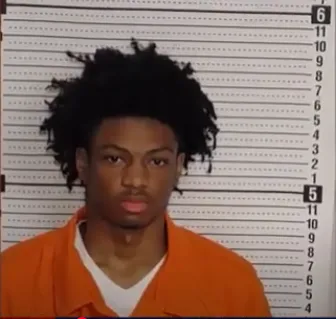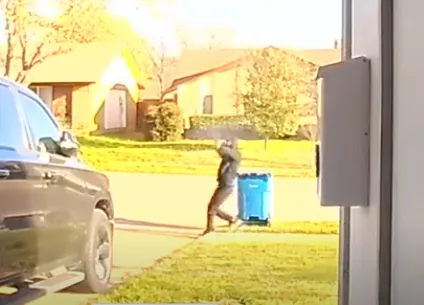High School Student Arrested Over Diss Track: A Battle That Escalated
A Heritage High School student, Cortez Lyles, was arrested after posting a diss track on his Instagram, which led to charges being filed against him. The song, which contained threatening lyrics, was considered a “terroristic threat” by authorities, resulting in Lyles’ arrest. This incident has sparked discussions about the consequences of online behavior and how seemingly harmless internet posts can escalate into serious legal matters.

The Diss Track Incident
Cortez Lyles, an 18-year-old football player at Heritage High, was involved in a physical altercation with a teammate. According to Lyles’ family, the incident occurred when the other player jumped him, leading to a confrontation. Lyles’ father claims that the altercation left his son with a noticeable injury, a “big knot on the top” of his head.
Despite this, Lyles’ parents, particularly his father, urged him not to fight back physically, instead advising him to handle the situation through other means. In response to the confrontation, Lyles recorded a diss track that would eventually land him in legal trouble.
Diss tracks are a well-established tradition in hip-hop music, typically involving artists calling out or mocking others, sometimes even threatening them. They are often seen as a form of artistic expression and rivalry, usually among celebrities or musicians. However, in this case, Lyles’ diss track was not received in the same spirit. The lyrics, which contained a violent message, were deemed by authorities to be a direct threat. In the song, Lyles rapped about getting revenge on his adversary, with lines such as, “I’m a beat his drop a diss and then I’ll take his, get a body bag or save his ‘cuz I ain’t Spanish. I’m a scorpion.”
The Fallout From the Diss Track
The song was posted on Lyles’ Instagram page in November, but the situation did not escalate until months later. The mother of the other player involved in the altercation took issue with the diss track and filed charges against Lyles, which led to his arrest in January. The charges were based on the song’s violent and threatening content, which prosecutors deemed to be a “terroristic threat.” The mother’s decision to file charges months after the incident occurred raised questions from Lyles’ family and community members. They expressed confusion as to why the charges were filed so long after the song had been posted.
In interviews with the media, Lyles’ family expressed disbelief that a diss track, a common feature in hip-hop culture, had resulted in such serious consequences. Lyles’ father emphasized that they had tried to avoid violence and resolve the issue peacefully. He also questioned why the charges were not filed earlier, given that there were multiple opportunities for the situation to be addressed before it escalated to legal action.
Lyles’ arrest occurred at his high school campus, causing a stir among students and faculty. As a senior hoping to join the Air Force, Lyles faced potential consequences not only for his legal situation but also for his future aspirations. His parents, while supportive of their son, also understood the seriousness of the charges and hoped that a resolution could be reached.
The Legal Ramifications
Lyles was charged with making a terroristic threat, a misdemeanor. The legal definition of a terroristic threat typically refers to any communication that expresses intent to cause harm or fear, which is what authorities believed Lyles’ diss track represented. Though the charge is a misdemeanor, it could have lasting consequences for Lyles, both legally and personally. If convicted, Lyles could face penalties, including a criminal record, fines, or potential jail time. Furthermore, such a conviction could impact his chances of joining the Air Force or pursuing other opportunities in the future.
In the case of the other player involved in the altercation, the mother’s decision to file charges over a diss track raises concerns about the boundaries of free speech and artistic expression. While the song’s lyrics were undeniably violent, many would argue that they were intended as part of the hip-hop tradition of battle rapping. Diss tracks often contain exaggerated language and boasts that should not be taken literally. However, the authorities viewed the lyrics through the lens of potential harm, resulting in the charges against Lyles.
Reaching Out for Resolution
Amid the legal battle, Lyles’ family expressed a desire to resolve the issue amicably with the other player’s family. Lyles’ parents hoped to sit down with the other family and reach a mutual understanding, hoping that the conflict could be resolved outside of the courtroom. This effort to find common ground reflects the family’s desire to move past the situation without further escalation.
Lyles’ arrest serves as a reminder of the potential consequences of online behavior, particularly when it involves violent or threatening language. The incident highlights how digital content, even if intended as artistic expression, can have real-world repercussions. It also raises important questions about how society should balance the freedom of expression with the need to protect individuals from harm, particularly when it comes to minors.
Conclusion
The arrest of Cortez Lyles underscores the fine line between artistic expression and legal responsibility. While diss tracks have long been a staple of hip-hop culture, the violent nature of Lyles’ song led to serious consequences. As the case continues to unfold, it will likely prompt further discussions about the role of social media in shaping public perceptions and the legal boundaries of free speech. Lyles’ story serves as a cautionary tale for others who may consider using social media to resolve personal conflicts, particularly when the message may be misinterpreted or deemed threatening by others.



